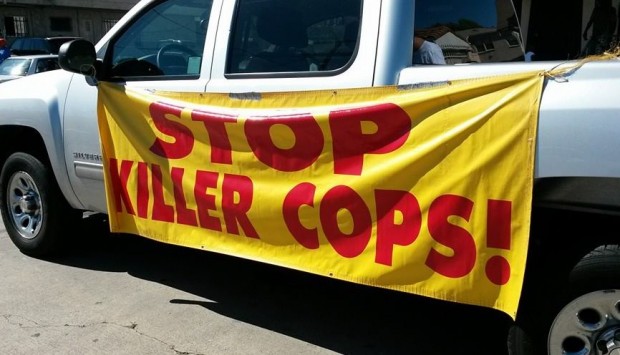 Guess all those boycotts are starting to get to Arizona. After about a year of just vying for “Most Fascist State” lawmakers there decided that directly picking a fight with the 14th Amendment may be a bit much. The bill that would have done that – which was geared to deny citizenship to children of undocumented workers – went down in flames when supporters could not get enough votes in the Senate. We are actually surprised. Arizona has been so bad over the past year, one American Renaissance supporter suggested their conference should be moved there! We submit that they shouldn’t since AZ Senate President Russell Pearce and Maricopa County Sherriff Joe Arpaio might not like the competition. Then again, if this trend keeps up, they might not be around to compete to begin with. So kudos, Arizona. You managed to get one in the win column!
Guess all those boycotts are starting to get to Arizona. After about a year of just vying for “Most Fascist State” lawmakers there decided that directly picking a fight with the 14th Amendment may be a bit much. The bill that would have done that – which was geared to deny citizenship to children of undocumented workers – went down in flames when supporters could not get enough votes in the Senate. We are actually surprised. Arizona has been so bad over the past year, one American Renaissance supporter suggested their conference should be moved there! We submit that they shouldn’t since AZ Senate President Russell Pearce and Maricopa County Sherriff Joe Arpaio might not like the competition. Then again, if this trend keeps up, they might not be around to compete to begin with. So kudos, Arizona. You managed to get one in the win column! Arizona Daily Star
PHOENIX – A bid to deny citizenship to the children of illegal immigrants faltered Monday when proponents could not get the votes of a Senate panel.
After more than three hours of testimony at the Senate Judiciary Committee, Sen. Ron Gould, R-Lake Havasu City, yanked the two measures. Gould said he lacked the backing of four other members of the Republican-controlled panel, which he chairs.
Gould said he will keep trying to secure votes. And Senate President Russell Pearce, R-Mesa, said, if necessary, he will reassign the proposal to a more friendly committee.
The failure came despite Gould’s allowing John Eastman, a Chapman University law professor, to argue for more than an hour that there is no legal basis for the current practice of giving citizenship to all children based on the location of their birth. Eastman said passing the two measures proposed by Gould would finally give the nation’s high court a chance to squarely address the scope of the 14th Amendment.
The amendment says that persons born in this country and “subject to the jurisdiction thereof” are considered U.S. citizens.
Gould and Pearce contend that was never the intent of those who wrote the measure approved after the Civil War. The intent was solely to clarify that former slaves and their children were entitled to citizenship despite a pre-war court decision declaring the contrary, they argue.
One proposal would define Arizona citizenship – and, by extension, U.S. citizenship – as requiring that at least one parent prove U.S. citizenship or permanent legal residency. The other would set up a system under which birth certificates would be marked as to whether they prove citizenship, with states agreeing to honor each other’s notations.
Even before any testimony, Sen. Adam Driggs, R-Phoenix, said the proposal, based on that idea of Arizona citizenship, raises a host of unanswered questions.
“I don’t understand how you become an Arizona citizen if you move to Arizona, what the bureaucratic model would be,” he said. “Do you then need to bring your own birth certificate and both of your parents’ birth certificates?”
There were also several children who spoke against the bill, including 12-year-old Heide Portugal who said she was born in this country but her parents were not and that a measure like this, had it been in effect, would have denied her citizenship.
The proposals also drew opposition from the business community.
Kevin Sandler, president of Exhibit One, said he worried about the message adopting such a law would send.
Sandler said his firm, which provides audiovisual equipment to courts across the nation, had to lay off six employees after some out-of-state firms boycotted Arizona businesses after lawmakers adopted SB 1070 last year. That measure gives police more power to detain illegal immigrants.
“We’ve created a toxic environment,” he told lawmakers. “Businesses don’t want to move here.”
He said companies looking to relocate pay attention to the political climate in a state.
“What we’ve really done is create a not-open-for-business environment here.”
And Glenn Hamer, president of the Arizona Chamber of Commerce and Industry, told legislators they should leave the question of citizenship where it belongs: in Congress.
Aside from Eastman, all of the testimony was in opposition. Activist Salvador Reza said the debate over which children get legal recognition is “not very dissimilar to the debate that happened in South Africa not too long ago.”
“Young kids like this were denied citizenship for whatever reasons,” Reza said.
Jennifer Allen, executive director of the Border Action Network, said denying citizenship to children born in this country based on a parent’s citizenship would create “a permanent underclass” of people in the state.
After more than three hours of testimony at the Senate Judiciary Committee, Sen. Ron Gould, R-Lake Havasu City, yanked the two measures. Gould said he lacked the backing of four other members of the Republican-controlled panel, which he chairs.
Gould said he will keep trying to secure votes. And Senate President Russell Pearce, R-Mesa, said, if necessary, he will reassign the proposal to a more friendly committee.
The failure came despite Gould’s allowing John Eastman, a Chapman University law professor, to argue for more than an hour that there is no legal basis for the current practice of giving citizenship to all children based on the location of their birth. Eastman said passing the two measures proposed by Gould would finally give the nation’s high court a chance to squarely address the scope of the 14th Amendment.
The amendment says that persons born in this country and “subject to the jurisdiction thereof” are considered U.S. citizens.
Gould and Pearce contend that was never the intent of those who wrote the measure approved after the Civil War. The intent was solely to clarify that former slaves and their children were entitled to citizenship despite a pre-war court decision declaring the contrary, they argue.
One proposal would define Arizona citizenship – and, by extension, U.S. citizenship – as requiring that at least one parent prove U.S. citizenship or permanent legal residency. The other would set up a system under which birth certificates would be marked as to whether they prove citizenship, with states agreeing to honor each other’s notations.
Even before any testimony, Sen. Adam Driggs, R-Phoenix, said the proposal, based on that idea of Arizona citizenship, raises a host of unanswered questions.
“I don’t understand how you become an Arizona citizen if you move to Arizona, what the bureaucratic model would be,” he said. “Do you then need to bring your own birth certificate and both of your parents’ birth certificates?”
There were also several children who spoke against the bill, including 12-year-old Heide Portugal who said she was born in this country but her parents were not and that a measure like this, had it been in effect, would have denied her citizenship.
The proposals also drew opposition from the business community.
Kevin Sandler, president of Exhibit One, said he worried about the message adopting such a law would send.
Sandler said his firm, which provides audiovisual equipment to courts across the nation, had to lay off six employees after some out-of-state firms boycotted Arizona businesses after lawmakers adopted SB 1070 last year. That measure gives police more power to detain illegal immigrants.
“We’ve created a toxic environment,” he told lawmakers. “Businesses don’t want to move here.”
He said companies looking to relocate pay attention to the political climate in a state.
“What we’ve really done is create a not-open-for-business environment here.”
And Glenn Hamer, president of the Arizona Chamber of Commerce and Industry, told legislators they should leave the question of citizenship where it belongs: in Congress.
Aside from Eastman, all of the testimony was in opposition. Activist Salvador Reza said the debate over which children get legal recognition is “not very dissimilar to the debate that happened in South Africa not too long ago.”
“Young kids like this were denied citizenship for whatever reasons,” Reza said.
Jennifer Allen, executive director of the Border Action Network, said denying citizenship to children born in this country based on a parent’s citizenship would create “a permanent underclass” of people in the state.


More Stories
PHILADELPHIA GREENS APPLAUD RECENT DECISION IN MUMIA'S CASE; STILL PUSHES FOR NEW TRIAL
AT LONG LAST, ARIZONA STATE SENATOR RUSSELL PEARCE IS OUT!
ARIZONA: 'MAKE NO MISTAKE ABOUT IT…RUSSELL PEARCE HAS BEEN RECALLED!'